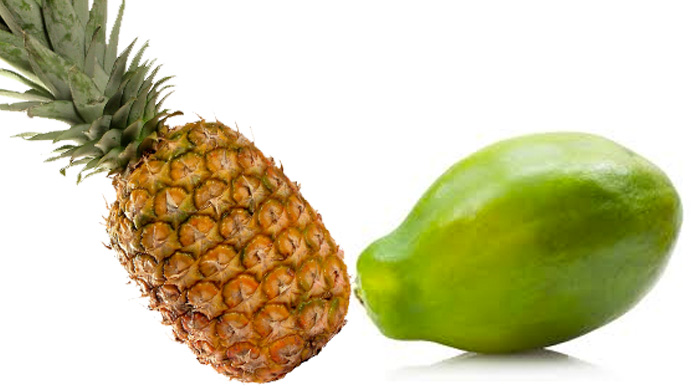Bromelain And Papain Plant Enzymes Aid In The Digestion Of Proteins
I Used Bromelain And Papain Dissolve Proteins As Part Of My Small Intestine Cleanse

From my post on the benefits of mullein you saw that I cleaned my small intestine by using mullein to remove harmful mucoid lining the intestine. In order for the mullein to be effective, I also had to remove the proteins stuck in the mucoid substance. I used two natural plant based digestive enzymes to dissolve these trapped proteins: bromelain and papain.
Bromelain – A Digestive Enzyme
Bromelain extract is a mixture of protein-digesting enzymes called proteolytic enzymes or proteases and other substances, extracted from the Bromeliaceae plant family. Pineapples belong to the Bromeliaceae family, and contain two main protein-digesting enzymes: stem bromelain found in the stem, and fruit bromelain found in the fruit. Stem bromelain is the more common source of bromelain used commercially.
Bromelain was first isolated by the Venezuelan chemist, Vicente Marcano. Traditonally bromelain has been used as a meat tenderizer because of its ability to digest proteins, but if left on meat for too long, it will turn it to mush. Bromelain is also used to aid in the digestion of meats, and can be useful to people who eat a lot of meat and who do not properly digest their meat because of the large amounts of meat that is ingested. I used bromelain specifically for its protein-digesting enzymes to remove the proteins entangled and embedded in the mucoid coating my small intestine, and to my surprise bromelain has more special properties.
Bromelain – An Anti-Inflammatory Agent And Wound Dressing
Pineapple has a long history of traditional use among the people native to Central and South America. They have traditionally used pineapple dressings to treat wounds and skin injuries to reduce inflammation, and they drank pineapple juice to treat stomachaches and indigestion. Bromelain is now taken orally by many people all over the world as an anti-inflammatory agent.
The German Commission E approved bromelain to treat swelling and inflammation after surgery, particularly sinus surgery. Some studies show that bromelain may help reduce cough and nasal mucus associated with sinusitis, and relieve the swelling and inflammation caused by hay fever.
The Natural Medicines Comprehensive Database does not definitively support bromelain's anti-inflammatory abilities but it does list bromelain as being "possibly effective for" arthritis (osteoarthritis) pain and knee function when used in combination with trypsin and rutin, and that this combination seems to be about as effective as some prescription painkillers. Bromelain is also listed as being "possibly effective for" preventing muscle soreness (myalgia) after exercise, but more evidence is needed to rate its effectiveness for: reducing swelling after surgery or injury, treating burns, inflammation, ulcerative colitis, and hay fever.
Bromelain – The Blood Thinner
Bromelain possesses anticoagulant properties and in studies has been found to be beneficial in reducing the clumping of blood platelets and blood clots, and the formation of plaques in the arteries, which is helpful in treating some cardiovascular disease.
Bromelain is considered to be safe when taken in the recommended dosage, but as always, women who are pregnant should consult with their physicians before taking any medicine or herbal supplement.
References:
Medline Plus
Memorial Sloan-Kettering Cancer center – Bromelain
Bromelain reduces human platelet aggregation
University of Maryland Medical Center – Bromelain
American Cancer Society – Bromelain
Bromelain.net
Tags: bromelain, detoxify, mullein, nutrition, papain, small intestine cleanse






